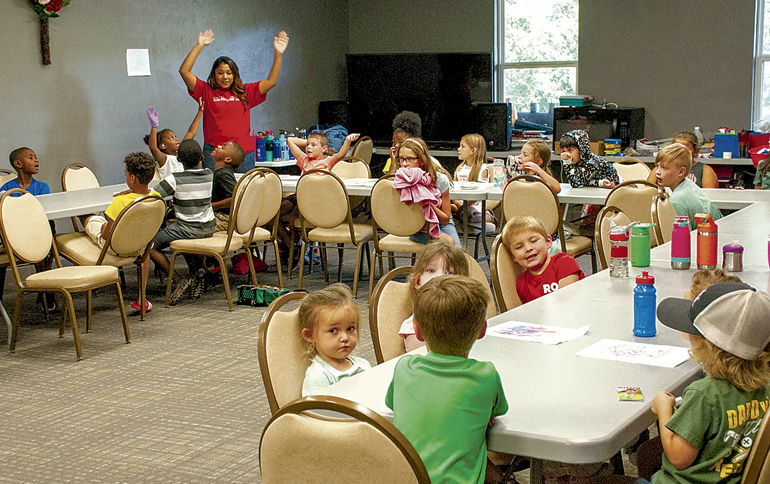HIGH SPRINGS ‒ Summer can be hard on parents trying to balance work and accommodate time for young children. Pastor Adam Joy of the Deeper Purpose Community Church is offering parents of nursery and pre-school children an all-day program at the church called the Kid's Academy for toddlers and preschoolers ages 1-5.
Parents needn’t worry this is just a babysitting situation. In addition to meals and play time, youngsters will also receive educational assistance. Children will be helped to prepare for the Florida Department of Education approved Pinnacle Program curriculum, which offers a wide range of both secular and faith-based age-appropriate lesson plans and activities for children ages birth to 5.
The Academy is available Monday -Friday from 7 a.m. to 5 p.m. The church also offers transportation by bus for parents who can’t bring their children to the church. While the program currently is for children over 1 year old, there are plans expand it to accept ad enroll infants in August according to Pastor Adam Joy.
“We feel it’s vital that we have the best teachers, assistants and childcare workers assisting us in ensuring your child is always able to play, learn and grow in a safe, caring and loving Christian environment,” Joy said. “We believe it is important to offer educational opportunities and socialization with other children to help children grow and expand their abilities.” Joy said the preschool is a member of Green Apple Accreditation of Children Services that licenses and accredits childcare centers and preschools nationwide.
In addition to the Kid's Academy program, the church also offers a summer camp for kids age 5-12, with educational classes in math, art, social studies, English and writing. The summer camp runs Monday -Friday from 7:30 a.m. to 5:30 p.m. On Wednesday evenings they also offer a youth services for kids ages 12 to 18, which provides teens an opportunity to learn about the bible, play games and hold group discussions about issues involving their age group. It also includes a free dinner.
The church may also be offering a Head Start Program and an Early Head Start Program this fall that will start Aug. 18. In addition, there will also be before and after care for school aged children in the upcoming 2021-22 school year.
Joy said the church also plans to offer programs to families during the Alachua County Public Schools Thanksgiving break, and spring and winter breaks, based on the school calendar.
“We have also decided that since we now have the room, we will do our own pre-kindergarten program for this coming school year beginning Monday, August 16,” said Joy. This program will have 20 spots for students who are turning 4 no later than Sept. 1. Unlike VPK, which is only a three-hour program, this will be a full day for students to better prepare them for kindergarten.
“We really feel that three hours just isn’t enough,” said Joy. “Children are our future, and we have a responsibility to provide as many opportunities as we can to help them build successful lives.”
Deeper Purpose Community Church is located in High Springs at 19930 N U.S. Hwy 441. Additional information and registration can be discussed at 386-454-5300 or at https://www.facebook.com/KidsOfPurpose.
# # #
Email rcarson@
alachuatoday.com




